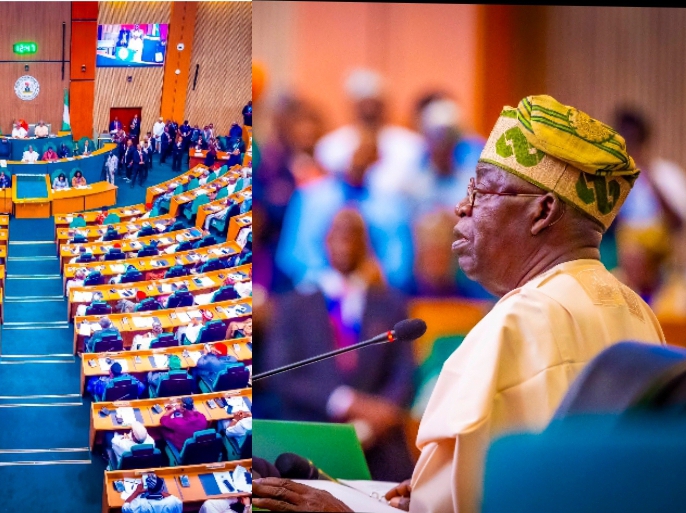Tinubu presents 2025 budget…here’s what to know

Photo Credit: X (Twitter)
Nigerian president Bola Ahmed Tinubu on Wednesday, 18th December, 2024, presented the 2025 budget to the National Assembly.
The budget entitled “Budget of Restoration: Securing Peace, Rebuilding Prosperity” stands at ₦49.7 trillion, the largest presidential budget ever in Nigeria’s history.
READ ALSO: Nico, Kvaratskhelia: Wingers United can Sign to Succeed Exiting Rashford
Ibadan funfair stampede claims lives…here’s what to know
In his interesting address, the president said, “I hereby present the 2025 budget to the joint session of the 11th National Assembly.” The lawmakers corrected him, saying it’s “10th.” And the president responded, “10th? I wrote 11th, which means you are all reelected.”
This ridiculously earned him a great ovation from the Assembly.
President Tinubu further mentioned the achievements of the 2024 budget. He said, “We have witnessed economic growth of 3.46% in Q3 2024, up from 2.54% in Q3 2023. Our foreign reserves now stand at $42 billion, providing robust economic security, and we now have a trade surplus of ₦5.8 trillion, reflecting the resilience of our policies.”
In a statement released on his X handle, Mr. Tinubu said, “This budget reflects our administration’s unshakeable commitment to stabilising our economy, improving lives, and paving the way for a brighter future for every Nigerian.
“The time for lamentation is over. This is a time to act. A time to support and promote greater investment in the private sector. A time for every Nigerian to look hopefully towards a brighter future because a new day has dawned for us as a nation.”
Key things to know about the 2025 budget:
The president anticipates a target of ₦34.82 trillion in revenue to fund the ₦49.7 trillion budget. He allocated debt servicing at ₦15.81 trillion. This leaves a deficit of ₦13.08 trillion, approximately 3.89%, which the GDP will make up for.
He called the budget “ambitious” but said it’s necessary to secure Nigeria’s future.
The 2025 budget prioritised four sectors for its major allocation. They are:
₦4.91 trillion for Defence and Security
₦4.06 trillion for infrastructure
₦3.52 trillion for Education
₦2.48 trillion for health
On security and defence, the president said that the government will continue to provide tools and technologies that help to ensure the security of everyone in the country. He also promised to empower the security agencies against banditry and insurgency.
On infrastructure development, he said he will embark on key legacy projects like the Lagos-Calabar and Sokoto-Badagry highways, which will improve the lives of Nigerians and contribute to high economic output.
On human capital development, he focused on improving education, health, and social services.
He said he has made provision for 826.90 billion naira for infrastructure development in education, which covers Universal Basic Education (UBEC) and nine other institutions.
On health, the president said the budgeted ₦2.48 trillion, including ₦402 billion for infrastructure and ₦282.65 billion for the Basic Health Care Fund, to revitalise healthcare services, noting that the Universal Health Coverage initiatives will strengthen primary healthcare systems across Nigeria.
He also recognised the critical role agriculture plays in ensuring food security. The budget made provisions to support farmers with funding and inputs, aiming to reignite productivity and an abundant food supply. He said, “Increasing agricultural production is central to our food security agenda, but insecurity has crippled this vital sector. We will support our farmers with funding and inputs to reignite productivity.”
While the budget outlines ambitious goals for the country, it has garnered a lot of reactions from various individuals.

